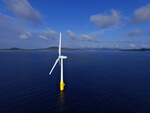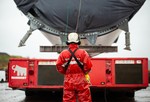01/17/2008
Europe - EU targets could force Britain to build thousands of wind turbines
The British coastline is set for a dramatic increase in wind farms and tidal energy plants as the Government strives to meet a European target for renewable energy.
The pressure to speed up plans for thousands of wind turbines and the controversial Severn barrage is likely to be intense. The EU is expected to order Britain this week to raise its game from 2 per cent of renewable energy to 15 per cent by 2020. The EU package, to be published on Wednesday, will also confirm a binding target for 10 per cent of all fuel to come from biofuel, despite the warning today from MPs about its drawbacks.
Green campaigners say that the renewable energy target, backed by hefty fines, will be tough for Britain to meet after years of talking up its environmental credentials without putting effective policies in place. Offshore wind and wave power are seen as the main sources of this green energy, which is likely to transform many coastal areas when at least 7,000 extra wind turbines are built. There may be benefits, however, if communities are allowed to set up projects to sell energy back to the national grid.
Ministers are keen on the Severn barrage, which could provide up to 5 per cent of the country’s renewable electricity needs, but wildlife campaigners have said that it will wreak havoc on surrounding ecosystems.
The EU insists that its proposals will cost no more than 0.5 per cent of GDP, in Britain’s case a total of £7 billion. Tony Blair signed up Britain last March to the general target of 20 per cent renewable energy across the 27-member EU and ever since diplomats have been wrangling over each country’s contribution. The 15 per cent goal for Britain is considered tough by ministers but they know that they cannot complain after claiming to lead Europe’s green campaign.
Other countries are already giving warning that their draft renewable targets are impossible. President Sarkozy of France is arguing against an increase from 10 per cent to 23 per cent.
The Government hopes that under the EU plan it will be able to buy renewable energy from other countries and count it against its own target. That would help to limit the impact of wind and wave projects around Britain but other countries fear that they will end up subsidising rich countries to carry on using fossil fuels.
Steve Webb, the Liberal Democrat environment spokesman, said: “We urgently need a blueprint on how we get to the new target, without paying someone else to bail us out. With our shoreline and our climate, we ought to be doing much better. Many comparable countries have already made far more headway than we have.”
In 2005 Britain was 22nd in the EU for renewable energy behind countries such as Sweden on 30 per cent and Portugal on 13 per cent. Britain’s 15 per cent target will cover all the country’s energy needs, including transport and industrial heating and cooling, which are more difficult to provide from renewable sources than electricity. That is why experts are giving warning that a goal set last year to produce 15 per cent of electricity from renewables by 2015 now looks underambitious.
The pressure to speed up plans for thousands of wind turbines and the controversial Severn barrage is likely to be intense. The EU is expected to order Britain this week to raise its game from 2 per cent of renewable energy to 15 per cent by 2020. The EU package, to be published on Wednesday, will also confirm a binding target for 10 per cent of all fuel to come from biofuel, despite the warning today from MPs about its drawbacks.
Green campaigners say that the renewable energy target, backed by hefty fines, will be tough for Britain to meet after years of talking up its environmental credentials without putting effective policies in place. Offshore wind and wave power are seen as the main sources of this green energy, which is likely to transform many coastal areas when at least 7,000 extra wind turbines are built. There may be benefits, however, if communities are allowed to set up projects to sell energy back to the national grid.
Ministers are keen on the Severn barrage, which could provide up to 5 per cent of the country’s renewable electricity needs, but wildlife campaigners have said that it will wreak havoc on surrounding ecosystems.
The EU insists that its proposals will cost no more than 0.5 per cent of GDP, in Britain’s case a total of £7 billion. Tony Blair signed up Britain last March to the general target of 20 per cent renewable energy across the 27-member EU and ever since diplomats have been wrangling over each country’s contribution. The 15 per cent goal for Britain is considered tough by ministers but they know that they cannot complain after claiming to lead Europe’s green campaign.
Other countries are already giving warning that their draft renewable targets are impossible. President Sarkozy of France is arguing against an increase from 10 per cent to 23 per cent.
The Government hopes that under the EU plan it will be able to buy renewable energy from other countries and count it against its own target. That would help to limit the impact of wind and wave projects around Britain but other countries fear that they will end up subsidising rich countries to carry on using fossil fuels.
Steve Webb, the Liberal Democrat environment spokesman, said: “We urgently need a blueprint on how we get to the new target, without paying someone else to bail us out. With our shoreline and our climate, we ought to be doing much better. Many comparable countries have already made far more headway than we have.”
In 2005 Britain was 22nd in the EU for renewable energy behind countries such as Sweden on 30 per cent and Portugal on 13 per cent. Britain’s 15 per cent target will cover all the country’s energy needs, including transport and industrial heating and cooling, which are more difficult to provide from renewable sources than electricity. That is why experts are giving warning that a goal set last year to produce 15 per cent of electricity from renewables by 2015 now looks underambitious.
- Source:
- www.windfair.net, online editorial
- Author:
- Trevor Sievert, Online Editorial Journalist / Author: David Charter, Europe Correspondent
- Email:
- press@windfair.net
- Link:
- www.windfair.net/...
- Keywords:
- wind energy, wind farm, renewable energy, wind power, wind turbine, rotorblade, offshore, onshore


























